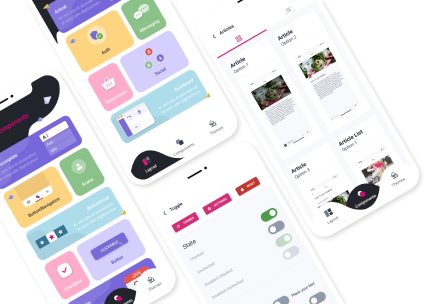Why Native Mobile Apps Are Better? Unlocking the Power of Seamless User Experience
Introduction
In a world driven by technology, mobile applications have become an integral part of our daily lives. With the growing demand for mobile user experiences, the choice between native and hybrid apps has been a subject of discussion. However, when it comes to providing unparalleled user experience, native mobile apps emerge as the clear winner. In this article, we will explore why native mobile apps are better in terms of performance, functionality, security, user engagement, and overall user satisfaction.

Native Mobile Apps: A Performance Powerhouse
Native mobile apps are specifically designed and developed for a particular operating system (OS) such as iOS or Android. This targeted approach allows developers to tap into the full potential of the underlying platform, resulting in exceptional performance. By utilizing device-specific features, native apps seamlessly integrate with the OS, delivering lightning-fast responsiveness and smooth animations. The optimized performance of native apps ensures a snappy user interface that leaves no room for frustration or lag.
Harnessing Functionality through Native Development
When it comes to functionality, native mobile apps have a significant advantage over their hybrid counterparts. By leveraging the native APIs and libraries provided by the platform, developers can unlock a wide range of capabilities. Whether it's accessing advanced camera features, utilizing GPS functionalities, or integrating with other native apps seamlessly, native mobile apps offer unparalleled versatility. This level of functionality empowers developers to create immersive and feature-rich experiences that cater to the unique needs of the users.
The Fortress of Security: Native Apps Stand Strong
In an era where data breaches and security vulnerabilities are on the rise, the security of mobile applications has never been more critical. Native mobile apps provide a robust security shield due to their inherent nature of being developed exclusively for a specific platform. By adhering to the platform's security guidelines and best practices, native app development ensures a higher level of protection against potential threats. Additionally, app store review processes for native apps add an extra layer of scrutiny, further enhancing the overall security and reliability.
Unleashing User Engagement: A Native Advantage
For businesses aiming to captivate their target audience, user engagement is key. Native mobile apps offer a set of tools and capabilities that enable businesses to create immersive experiences and foster deeper engagement with users. Push notifications, for instance, allow apps to deliver personalized messages, updates, and reminders directly to users' devices, ensuring they stay connected and informed. Furthermore, native apps can harness device-specific features like cameras, GPS, and accelerometers to provide unique interactive elements, enhancing the overall user experience.
The Ultimate User Satisfaction Recipe
Native mobile apps are designed with the end-user in mind, providing an unparalleled level of user satisfaction. By adhering to platform-specific design guidelines, native apps seamlessly blend with the overall look and feel of the operating system. This consistency creates a familiar and intuitive user interface, reducing the learning curve and making the app instantly accessible to users. Native apps also tend to perform better in offline mode, allowing users to continue using certain functionalities even without an active internet connection.
FAQs About Native Mobile Apps
Are native mobile apps more expensive to develop?
While native app development may require separate codebases for different platforms, the benefits it offers outweigh the initial investment. The enhanced performance, functionality, and user satisfaction achieved through native apps make them a worthwhile investment for businesses seeking long-term success.
Can hybrid apps match the performance of native apps?
Hybrid apps use web technologies wrapped in a native container, which can impact their performance compared to native apps. Although hybrid apps have made significant advancements, they still struggle to achieve the same level of seamless performance and responsiveness as native apps.
Are native mobile apps limited to specific platforms?
Yes, native mobile apps are developed for specific platforms such as iOS or Android. However, it is possible to develop separate versions of an app for different platforms to ensure maximum reach and impact.
Do native apps have better access to device hardware?
Yes, native apps have direct access to the device's hardware and APIs, allowing them to leverage advanced functionalities like geolocation, camera features, sensors, and more. This level of integration enables developers to create highly immersive experiences that go beyond the capabilities of hybrid apps.
Are native apps more secure than hybrid apps?
Native apps are generally considered more secure due to their adherence to platform-specific security guidelines and robust app store review processes. These measures contribute to a safer user experience, reducing the risk of data breaches and other security vulnerabilities.
Conclusion
In conclusion, the advantages of native mobile apps cannot be overstated. Their optimized performance, extensive functionality, robust security measures, enhanced user engagement capabilities, and ultimate user satisfaction make them the superior choice. Native app development allows businesses to tap into the full potential of the underlying platform, creating immersive experiences that leave a lasting impact on users.
So, why settle for anything less than extraordinary? Embrace the power of native mobile apps and unlock a world of possibilities for your business and its users. By investing in native app development, you can elevate your brand, drive customer engagement, and establish yourself as a leader in the digital landscape.









